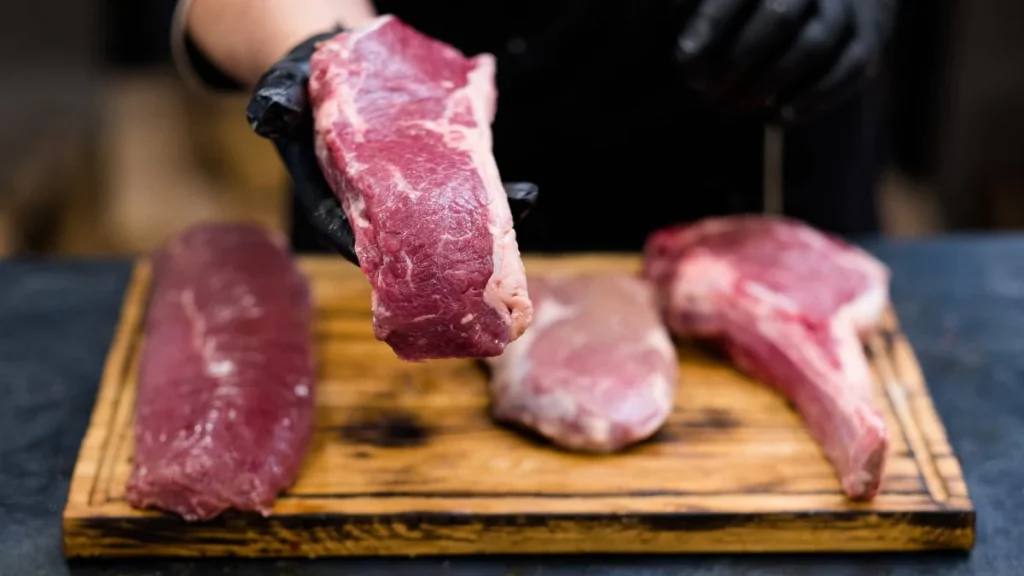- Between 10 per cent and 15 per cent of all beef, pig, chicken, and milk consumed in Africa will be imported by 2030 or 2050
- some 14 million tonnes of various meats were produced in 2014, with South Africa accounting for 20 per cent of the total or 2.6 million tonnes
- The overall volume of meat produced increased by 2.4 per cent the year between 2013 and 2018
Africa accounts for only 5 per cent of the world’s cattle, sheep, chicken, pork and goat meat.
Statistics show that some 14 million tonnes of various meats were produced in 2014, with South Africa accounting for 20 per cent of the total or 2.6 million tonnes. Egypt rounded out the top five with a tenth of a percentage point.
It is estimated that between 10 per cent and 15 per cent of all beef, pig, chicken, and milk consumed in Africa will be imported by 2030 or 2050. This shows the enormous untapped potential of this multibillion-dollar industry.
Read: Namibia: Statistics reveal shocking trend in livestock sector
For African countries to meet the increasing demand for meat products as a result of sustained economic growth, expanding populations, urbanization, and shifting dietary preferences, more than just lip service must be offered.
The four pillars of growth on the continent are agriculture, political stability, commodities, and population. As a result of this, governments continue to provide little attention to agriculture and this has stifled its growth. Consequently, Africans have been denied the financial freedom they have craved for decades because of this stifled progress.
The poultry industry, for example, is forecast to increase at a steady pace and reach 11 million tonnes by 2030. With this increase, chicken meat production on the continent increased by 4.2 per cent last year, to 5.7 million tonnes.
The overall volume of meat produced increased by 2.4 per cent the year between 2013 and 2018.
South Africa produced the most chicken on the continent in 2018 with an output of 1.8 million tonnes, followed by Egypt with 1.1 million tonnes and Morocco with 720,000 tonnes. The aggregate production of these three nations was 62 per cent.
There has been a rise in demand for animal-based goods, such as dairy, eggs, and meat, across Africa, according to new research from the Malabo Montpellier Panel.
Domestic cattle industries have been growing rapidly to satisfy demand, despite the fact that most African countries are still heavily dependent on imports.
It is also worth noting that Africa’s livestock sector is a vital part of the livelihoods of millions of people in the form of pastoralist, mixed crop-livestock farming, and commercial systems, with the potential to generate much-needed employment opportunities—especially for women and young people—along the value chain,” says the Panel.
It is recommended that livestock policies be developed in light of climate change and increasing resource scarcity, as well as concerns about animal health and human safety and a better understanding of how livestock-based products can both help address malnutrition and actually contribute to a range of positive social outcomes, in order to achieve better results.
There are case studies from four different countries in the paper that demonstrate how certain policies and practices are implemented in each country.
When it comes to alleviating poverty, assuring food security, and enhancing nutrition, Ethiopia’s government has taken great care and methodical effort to tailor policies and institutions for both pastoralist and non-pastoralist farmers.
Animal health, research, and marketing are being developed simultaneously in the most populous East African nation, attracting major investment from the commercial sector and international development organizations.
Mali, a landlocked country in West Africa, is putting a lot of effort into improving the health and nutrition of its livestock and encouraging the breeding of more productive cows. Infrastructure and equipment have also been developed to market the livestock sector in the region, and live animal exports have been facilitated by this investment.
With the Dairy Master Plan to liberalize the dairy industry and the restructuring and privatization of state-owned dairy processing enterprise Dairy Corp., Uganda has helped transform the dairy industry through its dedication to boosting its milk sector. The primary aim of Uganda’s programmatic initiatives is to improve the livestock sector, with a primary focus on the dairy value chain and ensuring that the country remains self-sufficient in milk production.
In Africa, there is a vast range of diverse livestock production systems. Pastoral, mixed crop-livestock, and commercial livestock systems are all examples of this type of farming system configuration. Governments must seek to address the unique qualities, issues, and possibilities of each of these areas.
Read: Demand overwhelming Kenya’s meat supply
